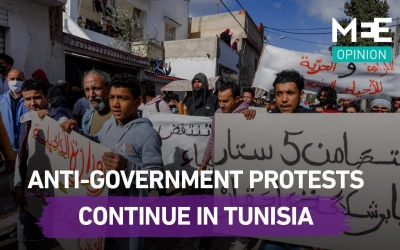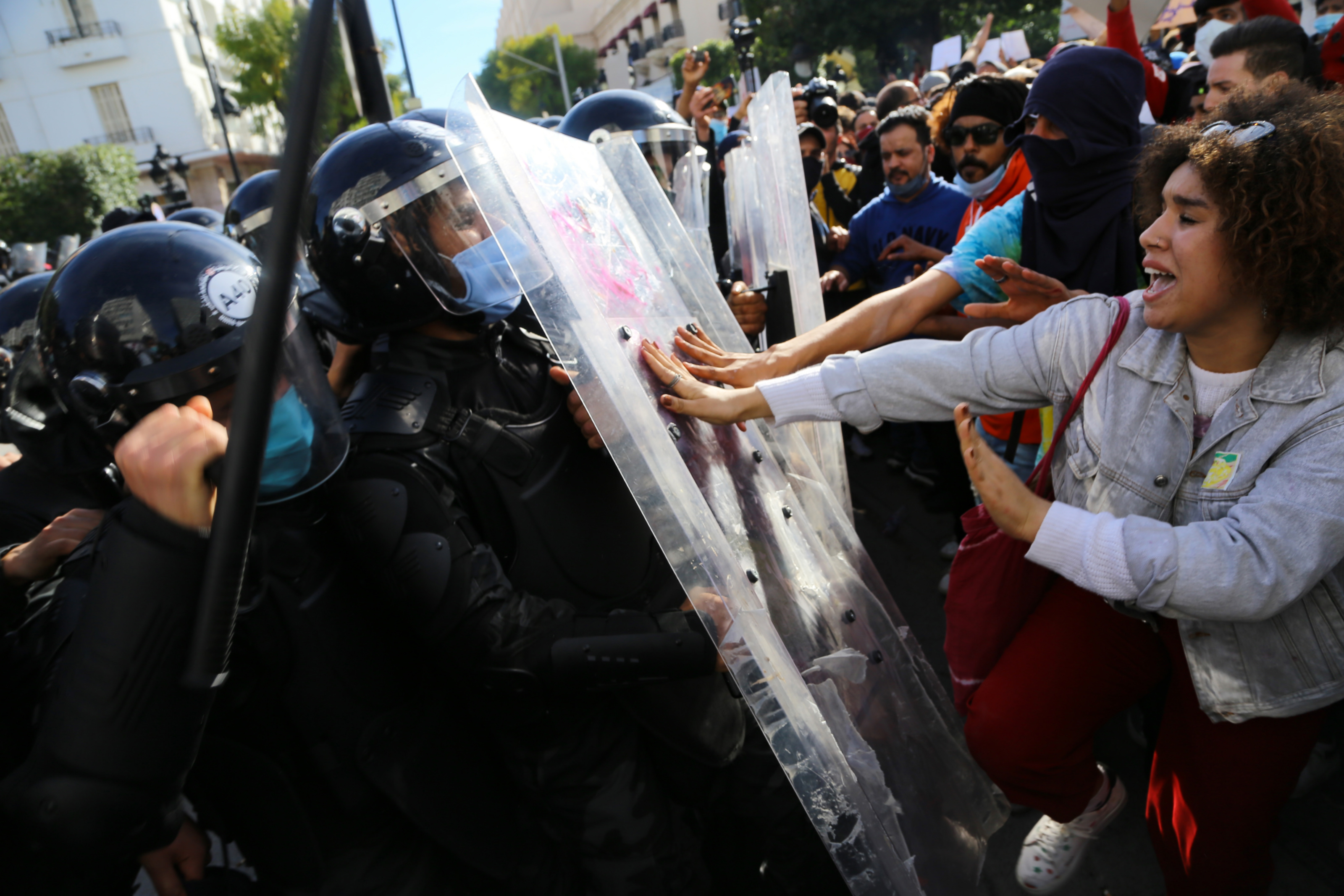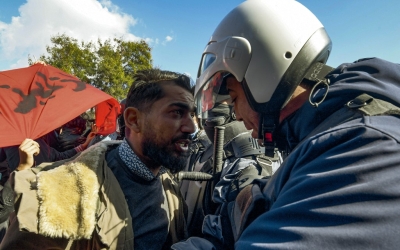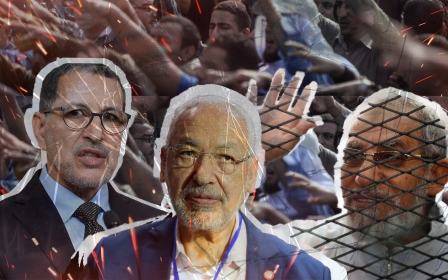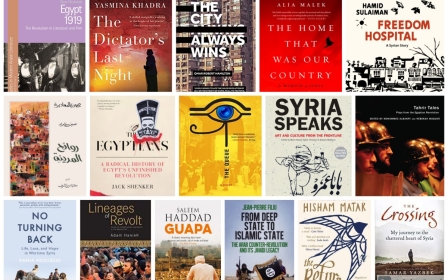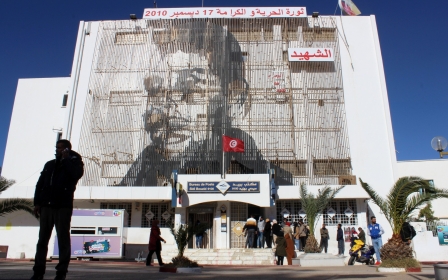Rached Ghannouchi: Tunisia's revolution needs more than 10 years to deliver
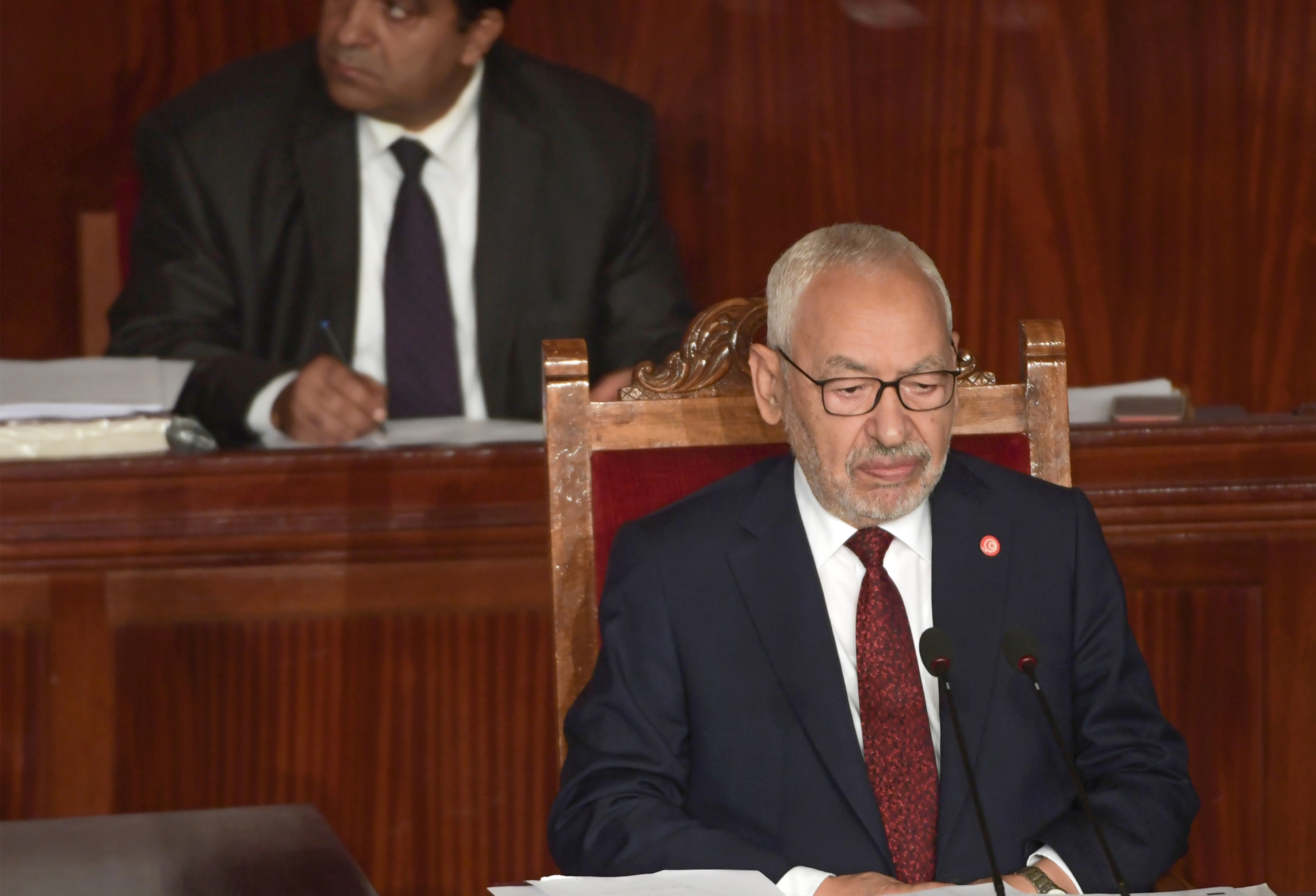
Tunisians marked 10 years since their famed Jasmine Revolution with a month of social unrest and calls for change. Political stalemate and a chronic economic crisis have left them chanting, once again, for the fall of the regime.
For Rached Ghannouchi, speaker of parliament and the head of one of Tunisia’s oldest parties, the change brought about by the revolution should not be denied, but it would take more than a decade to dismantle the damage caused by years of dictatorship, and a reliance on trust and compromise as principles to guide the way forward.
New MEE newsletter: Jerusalem Dispatch
Sign up to get the latest insights and analysis on Israel-Palestine, alongside Turkey Unpacked and other MEE newsletters
In an interview reflecting on the past decade, Ghannouchi, the co-founder of Ennahda, a self-defined Muslim-democratic movement and one of the most prominent parties in Tunisia, said the country has overcome numerous obstacles, and he was optimistic about Tunisian democracy.
On 14 January 2011, 28 days of protests put an end to the 24 years of Zine El Abidine Ben Ali’s authoritarian rule and inspired similar movements around the Arab world. While dictatorship returned to Egypt and civil wars broke out in other countries, Tunisia was trying its hand at a “start-up” democracy and being heralded as "the Arab exception".
Ennahda, founded in 1981 and banned under Ben Ali, won Tunisia’s first free elections in 2011 - nine months after the dictator was ousted - and has, since then, held power almost continuously.
“No one can say democracy has not delivered real change for our people. Our parliament is 29 percent female, we have approved a constitution, and have empowered local authorities in our quest for decentralisation,” he said.
“In the last budget of the Ben Ali era, prior to the Arab Spring, 82 percent of funds went to coastal towns. Refocusing investment in generating opportunities everywhere in Tunisia has been a top priority of the democratic era.”
Reality on the ground
Walking through the streets of downtown Tunis, however, one looks in vain for a similar perception of how well the Tunisian democracy is working. Instead, there are nationwide mass demonstrations, night-time riots, strikes and sit-ins, in a movement sometimes portrayed as a "second revolution".
Last week security forces carried out mass arrests, including of minors, and violently cracked down on daytime protests and night-time riots against poverty, corruption, police repression, and unemployment.
Frustration with the chaos created by political leaders since 2011 has been growing, with state firms going practically bankrupt, youth unemployment reaching over 35 percent and inflation running rampant.
“The people are right to protest because their expectations were high and the economic progress has been slower than they had thought, and then it was exacerbated by the Covid-19 pandemic,” Ghannouchi told MEE.
However, he added that citizens who are protesting peacefully for their rights need to be distinguished from those “who are there mainly to damage the streets”.
The politician, whose party is partly responsible for the crisis, said that democracy cannot be reduced to the casting of ballots.
“The revolution had two slogans: freedom and dignity. We have worked in the first few years on enshrining the freedoms that people have fought for in the most progressive constitution in the Arab world,” he said.
“Dignity is much more difficult to achieve as it aims to right the wrongs of 60 years of dictatorship. We took our first steps.
“I’m sure they are not enough and I’m sure our young people are not happy with this and we do understand their frustration.”
But Ghannouchi stressed that reform takes time, and that the crisis needs to be thought of in the wider contexts of geopolitics, terrorism, global recession, chronic low growth and the coronavirus pandemic.
“When our country set on this path, we could hardly have imagined the difficult conditions we would face,” he said.
Guiding principles
Today, at a moment when the country faces a reportedly unprecedented multi-faceted crisis, people can derive some hope from history, he added.
Ghannouchi said that Tunisia has been able to push through many obstacles through the willingness of its various players, who constitute its democracy, to work with one another and put the country first.
'Dignity is much more difficult to achieve as it aims to right the wrongs of 60 years of dictatorship. We took our first steps'
“This has to be our guiding principle as we go forward.”
The speaker believes that the secret of Tunisia’s success story is compromise and understanding, and looking back on the role of Ennahda, he claimed that his movement was quick to appreciate the need to work with others to achieve progress.
“So our role has been one of partnership, one with a strong stake in making Tunisian democracy work,” he said.
“I have always been clear that the interests of Tunisia come before Ennahda.
“These are not just words, there have been countless occasions over the last 10 years when we have compromised to ensure progress, including stepping down from governing in 2014, not because we lost elections but through the national dialogue.”
The national dialogue, which won a Nobel Prize in 2015, was an initiative taken by a quartet - made up of the union federation UGTT, the employers’ institute, the Tunisian human rights league and the order of lawyers - with the aim of solving the political crisis of 2013.
As part of the roadmap, the then Ennahda-led government had agreed to hand over power to an independent technocratic caretaker government to prepare for new elections.
However, self-preservation might also explain the partnership approach.
Tunisia’s political tapestry is dominated by centrist parties jostling for space with Ennahda and parties on the left and right, in a confusing four-cornered contest. In such a context, compromises are inevitable to ensure survival.
In any case, Ennahda’s unique position as Tunisia’s Muslim-democratic and probably most distrusted movement appears to be a formative factor for both the party and the country.
“We have made consensus-based politics our motto and we believe that transitional democracies need such consensus to be able to safeguard themselves from division and conflict,” Ghannouchi said.
Reconciliation law
Perhaps the most telling example of consensus-based politics is the controversial 2017 “administrative reconciliation law".
This initiative granted complete immunity to civil servants who were implicated in corruption under the former regime and allowed them to return to positions of power.
Many Tunisians, including people within Ennahda, perceived the approval of the Muslim democrats, then the second party in government and itself a victim of dictatorship, as high treason.
Nevertheless, Ghannouchi now cites the total reconciliation with the rulers of the former regime as a major priority. He recently put a leader of the old regime, Mohammed Ghariani, in charge of national reconciliation and of completing the file of transitional justice.
Ghariani was the secretary general of Ben Ali’s now dissolved, Democratic Constitutional Rally Party.
“We have lived exclusion, and we do not want that experience to be repeated with any of the forces in the country, whatever the topic of discussion,” he explained.
'We have lived exclusion, and we do not want that experience to be repeated with any of the forces in the country, whatever the topic of discussion'
“The ultimate aim for transitional justice should be to reach national reconciliation so that we can move to the future, unburdened by the problems of the past.”
However, the issues of reconciliation and transitional justice demonstrate how consensus-based politics not only constitutes Tunisian democracy’s biggest strength, but it is also its principal weakness.
Never-ending negotiations have kept successive governments in an almost perpetual stalemate, ultimately leading to compromises that no one understands. As a result, political parties fall apart and voters turn to more outspoken anti-system forces.
People have been wondering how to get out of the ongoing crises that are gripping the country’s democracy.
Like a growing number of political parties, Ghannouchi wants a new electoral law.
“The electoral system that we have had since the first elections after the revolution has led to the fragmentation of the political system and has prevented the emergence of strong majorities that can assume their responsibilities in governing and can, in turn, be held accountable by the people,” the speaker reflected.
“We, therefore, need to reform the electoral system if we don’t want our democracy to collapse.”
This article is available in French on Middle East Eye French edition.
Middle East Eye delivers independent and unrivalled coverage and analysis of the Middle East, North Africa and beyond. To learn more about republishing this content and the associated fees, please fill out this form. More about MEE can be found here.


